N.S. universities aren't the only ones with out-of-control street parties. Here's what others have done
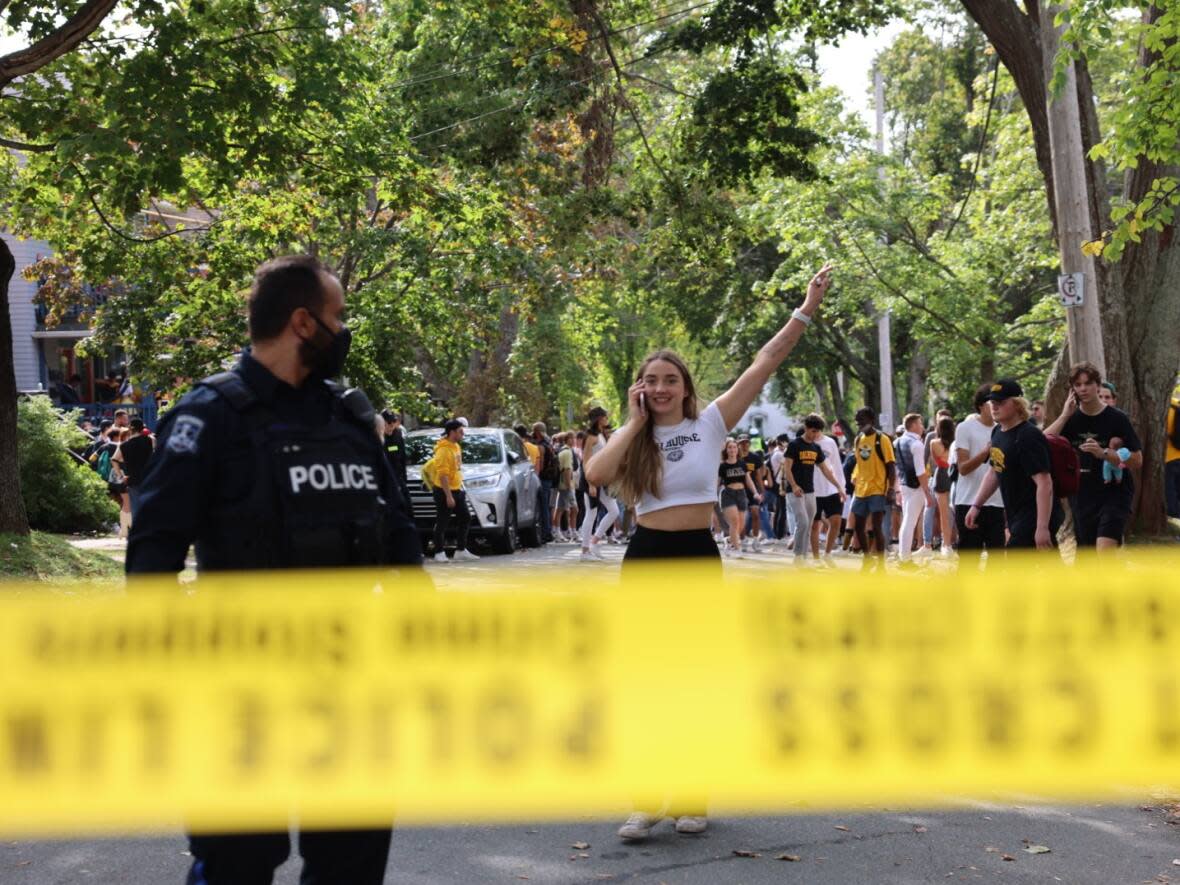
As two Nova Scotia universities celebrate homecoming this weekend, they're trying to solve the same problem facing schools in other provinces — wild parties.
On Thursday afternoon, a joint news release from Acadia University and St. Francis Xavier University says their events promote respectful and safe celebrations on campus with zero-tolerance for large street parties, drunkenness and open alcohol.
On Oct. 1, chaos broke out near Dalhousie University when thousands of students joined an unsanctioned, off-campus homecoming street party, lighting a bonfire and assaulting police officers. The school does not host an official homecoming weekend.
"Those who choose to attend large, unsanctioned house or street parties must understand that in addition to penalties under the student code of conduct, they may be fined and face other legal penalties," says Peter Ricketts, president and vice-chancellor at Acadia.
Ricketts says legal consequences also extend to those who host the parties and rental property owners.
The two universities are banning overnight guests in residence and increasing campus security on the weekend.
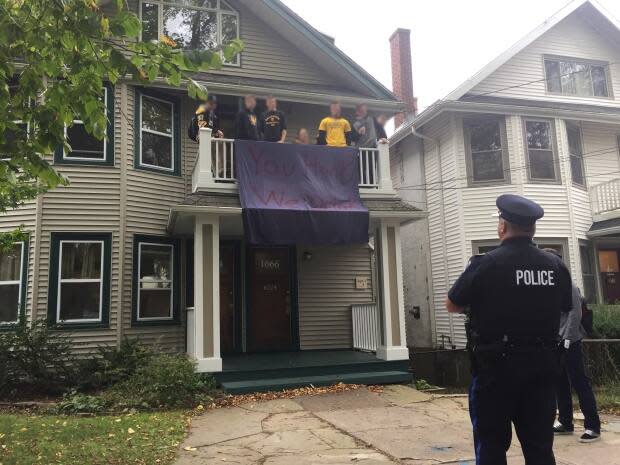
A number of Ontario universities have dealt with the problem using both hard and soft persuasion.
Waterloo's 'Mayor Dad' looked at options
On the same weekend mayhem unfolded in Halifax earlier this month, a series of smaller homecoming parties took place across Waterloo, Ont. It was a welcome contrast to past years when more than 30,000 students crammed onto one street, says Mayor Dave Jaworsky.
Jaworsky calls himself Mayor Dad because the city is home to 40,000 students who attend either Wilfrid Laurier University, the University of Waterloo or Conestoga College.
"We used to measure it in the number of ambulance rides and the number of students who went to hospital and they would go to hospital and about a third would be in serious condition," said Jaworsky.
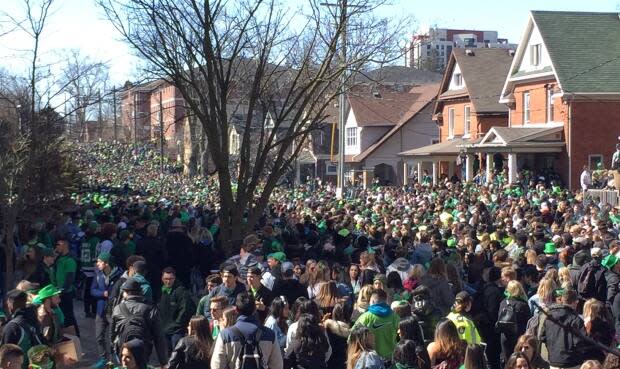
"As mayor dad, we don't want to lose any and we're lucky that we haven't. But you know, that's a chance each and every time this happens," he said.
He says addressing unsanctioned street parties means trying new things and stealing ideas from other cities.
A few years ago, the city tried making "management pods" on the main party street, with portable toilets, garbage cans and platforms for police to stand on to monitor the crowds. That didn't work, Jaworsky says, because it looked like the city was endorsing the party.
Instead, the city now fences off the main party street two days before a big weekend and only residents are allowed in.
Jaworsky says that forces students into small parties which police and bylaw can more easily monitor
In addition, Waterloo made its noise bylaw applicable 24 hours a day with increased fines or a trip to court for offenders.
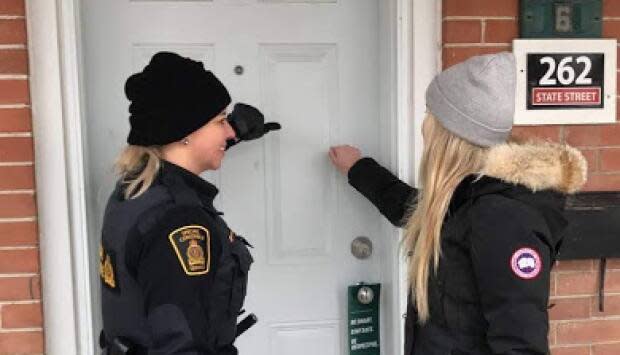
He says other community initiatives have helped too, like neighbourhood associations hosting barbecues in September and a door-knocking campaign with football players and police reminding students of possible fines.
Finally, he reminds students, if you wouldn't do it at your parents' home, don't do it here.
Saying thanks
"Just don't disturb the neighbours and celebrate and enjoy and meet new friends and to go from there."
This year was so successful, Jaworsky sent an open letter Oct. 3 thanking students for their downplayed partying.
"Leaders from across the community asked students to socialize and celebrate responsibly and we saw positive progress," he writes in the letter.
Kingston, Ont. uses University District Safety Initiative
A few hundred kilometres away, Kingston, Ont. and Queen's University have also wrestled with street partying.
To combat the unsanctioned gatherings, Kingston introduced the University District Safety Initiative allowing police to issue a court summons or a ticket payable directly to the city.
And when someone gets a court summons, they have to go to court, not just pay a fine online. A first-time offender may have to pay $500, but it could go up to $10,000.
The university district is not a defined area in Kingston, effectively applying to the whole city.
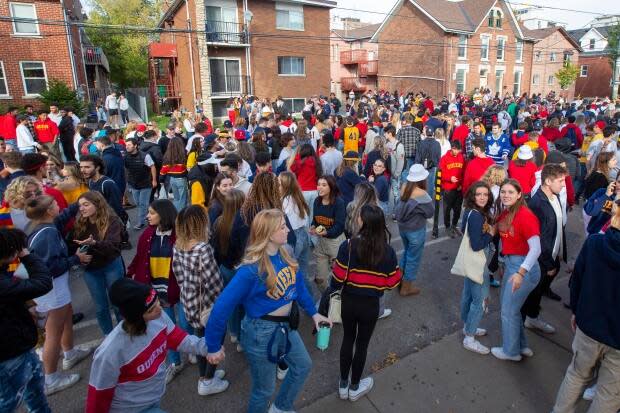
The initiative is a partnership between the city, Kingston Police and Queen's University. Started as a pilot project, it became permanent in 2019 for certain weekends like frosh week or homecoming, but can also be used any time of year if the Nuisance Party Bylaw is broken.
Dalhousie has studied Kingston, Waterloo approaches
Dalhousie University commissioned an independent report on street party culture that was released in September. It looked at how other universities and cities handled street parties, including using a compulsory credit course.
No one from Dalhousie University was available for an interview for this story.
In a statement to CBC, a spokesperson wrote, "Considerable efforts are made by the university to proactively monitor and communicate the potential risks involving unsafe student behaviour on and off campus, and through regular check-ins with [Halifax Regional Police.]"
St. FX has introduced four required modules for new students, including one called Healthy Socializing @ X. Students have to finish the modules before they're allowed to register for second year classes.
Healthy Socializing @ X includes topics like "exploring partying and why students do it" and "encourages students to be aware of their community and how their actions impact the experience of others."
MORE TOP STORIES


